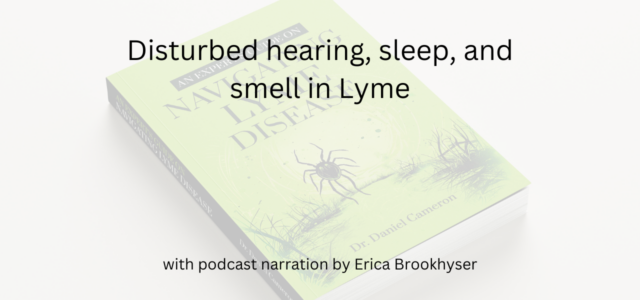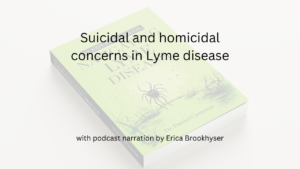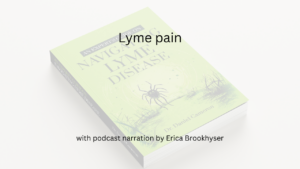Call for your appointment today 914-666-4665 | Mt. Kisco, New York

Welcome to another selection from my book “An Expert’s Guide on Navigating Lyme disease.” The book highlights the findings of my first 600 Lyme disease Science blogs. In this episode, I will discuss disturbed hearing, sleep, and smell in Lyme.
Lyme disease can lead to disturbed hearing, sleep, and smell.
Lyme disease associated with hearing loss and tinnitus.
The majority of patients with tick-borne diseases admitted to an outpatient otolaryngologic clinic in Poland suffered from hearing loss and tinnitus.
The most common complaint was tinnitus accompanied by vertigo, dizziness, headache, and unilateral sensorineural hearing loss (Sowula et al., 2018).
Patients also reported trigeminal neuralgia (a chronic pain condition affecting the trigeminal nerve in the face), hearing hypersensitivity, facial nerve paralysis, toothaches, tongue paresthesias, and smell hypersensitivity.
In a study of chronic neurologic Lyme disease, 4 out of 27 patients, ages 35-67, with chronic neurologic Lyme disease presented with hearing loss and tinnitus (Logigian et al., 1990). Read more.
Lyme disease and sudden onset hearing loss.
An article published in the Journal of Clinical Medicine describes 9 Lyme disease patients with sudden sensorineural hearing loss (SSNHL), also called sudden deafness. These patients were treated with antibiotics and experienced partial or complete regression of their deafness. (Sowula et al., 2021)
Unfortunately, two patients developed high-frequency tinnitus. (Sowula et al., 2021) “Infections caused by Borrelia burgdorferi may contribute to the development of inflammatory and angiopathic lesions, which are a possible cause of [sudden sensorineural hearing loss].” (Sowula et al. 2021) Read more.
Lyme disease triggered vertigo and hearing loss.
In a Polish study, hearing loss and tinnitus were symptoms that frequently accompanied vertigo in hospitalized Lyme disease patients.
Tinnitus was reported in 3 out of 5 of their Lyme disease patients, the majority of whom experienced high-frequency tinnitus.
Increasingly, tick-borne illnesses are a potential cause of neurological symptoms reported by patients, including hearing loss, tinnitus, ataxia, and vertigo. (Sowula et al., 2021) Read more.
New onset sleeping disorders in Lyme.
A study found that 41% of early Lyme disease participants reported new onset difficulty sleeping. (Weinstein et al., 2018) However, the majority of these patients reported their sleep quality returning to normal after antibiotic treatment.
Poor quality of sleep did not resolve for 6 participants. “Four out of six cases had moderate to severe trouble sleeping that they attributed specifically to pain.” “Five of six PTLDS cases indicated having some trouble sleeping due to bad dreams.”
PTLDS patients had significantly higher fatigue levels, greater cognitive-affective depressive symptoms, and a more significant functional impact resulting from their symptoms. (Weinstein et al., 2018) Read more.
Lyme disease sleep disorders.
Lyme disease patients experience a broad range of sleep disorders. The combination of “non-restorative sleep and chronic unremitting stress appear to play a significant role in disease progression.” (Bransfield, 2018)
“Both non-restorative sleep and the chronic unremitting stress seen in these chronically ill patients contribute to disease perpetuation and progression and are associated with fatigue, cognitive impairments, decreased regenerative functioning, compromised immunity, decreased resistance to infectious disease and neurodegenerative processes.” (Bransfield 2018) Read more.
[bctt tweet=”Lyme disease patients experience a broad range of sleep disorders.” username=”DrDanielCameron”]
Sleep disorders in Lyme.
Dr. Bransfield’s list of sleep disorders in Lyme: • Non-restorative sleep • Early insomnia • Middle of the night insomnia • Early morning insomnia • Excessive daytime sleepiness • Loss or reversal of circadian rhythm • Restless leg • Paroxysmal nocturnal limb movements • Sleep apnea (central and/or obstructive) • Sleep paralysis • Hypnagogic hallucinations • Sleep attacks • Cataplexy • Narcolepsy Read more.
The sense of smell can be increased.
For some Lyme disease patients, hyperosmia is not a blessing and is more than a simple annoyance. Hyperosmia is an overwhelming sensitivity to smells. It can cause extreme discomfort, even making patients sick at times. “The high prevalence of this olfactory disorder found in our study suggests the need for further studies of olfactory function in this disease.” (Puri et al., 2014)
In contrast, a decreased sense of smell (hyposmia) has been described in patients diagnosed with Fibromyalgia and COVID-19. Read more.
Lyme can present with sensory hyperarousal.
Sensory hyperarousal to lights and sound is a defining feature of central sensitization. It can be quite disturbing.
“The individual’s life may be quite altered by this hypersensitivity: wearing sunglasses indoors and avoidance of being outside during daylight, which, in turn, limits the ability to sustain a normal work and social life.” (Batheja et al., 2013)
In Post-Treatment Lyme disease Syndrome (PTLDS), “sensory hyperarousal was reported by most patients after acquiring Lyme disease, most often affecting hearing and/or vision. “The auditory hyperacusis seen in Lyme disease patients can be intense and incapacitating… in some individuals, even the volume fluctuations in a normal conversation can be noxious.” (Batheja et al., 2013) Read more.
Tullio phenomenon and Lyme.
Tullio phenomenon consists of dizziness or vertigo induced by sound. “Tullio patients describe disequilibrium, auditory and visual symptoms, which are recurrent, brief, and often triggered by loud noises or middle ear pressure changes, e.g., the Valsalva maneuver.” (Kaski et al., 2012)
A 35-year-old woman with Lyme disease presented with vertigo, loss of balance, and episodic nausea and vomiting. “These multisystem symptoms involvement occurred in response to sound and became so severe that even running tap water would sometimes cause the patient to fall or retch.” (Nields et al., 1991). The authors added, “An otolaryngologist noted the Tullio phenomenon and recommended tests for syphilis.
The tests for syphilis were negative. Her Tullio phenomenon resolved with two courses of intravenous ceftriaxone.




This disease leaves me hopeless…
I have patients who felt hopeless and still improved.
Dr Sam Bailey of New Zealand has made a short film entitled “The Lyme Disease Lie”. She claims, using what sound like reasonable rationales, that the Lyme entity is too diverse in symptomatology and fails on all the 4 basic tenets of Koch’s postulates. Dr Cameron, what are you thoughts on the subject, have you seen the film?
You seem to be referring to a 18 minute video rather than the movie. She discards much of the science behind Lyme and tick borne diseases The voices concerns we all have of never enough information. Her url address included the-Lyme-disease-lie https://drsambailey.com/resources/videos/germ-theory/the-lyme-disease-lie/
The “film” was more of a video post. I did not find post helpful.
Thank you for posting. This describes a lot of problems that I’ve been working through.
My patients have found it helpful to understand their condition as they prepare for treatment.